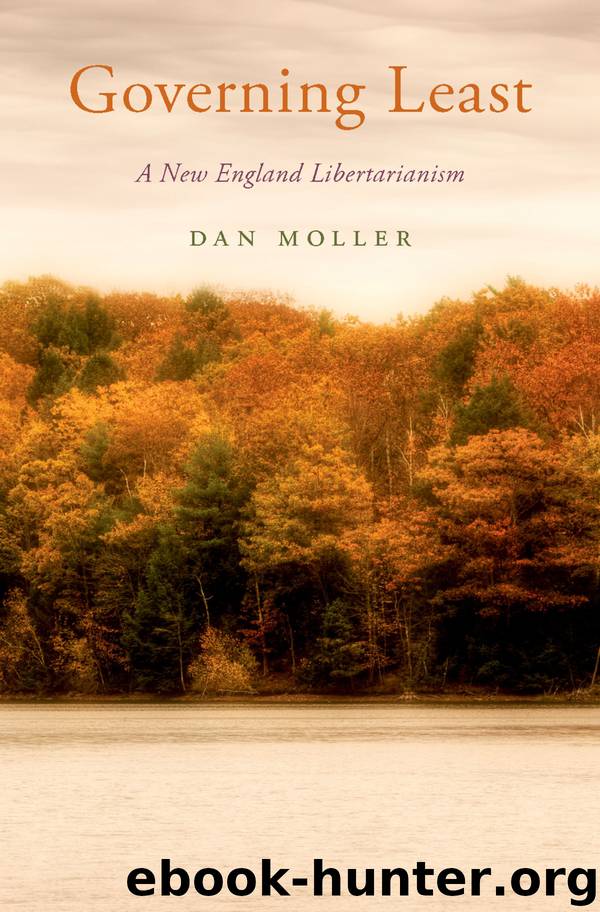Governing Least by Dan Moller

Author:Dan Moller
Language: eng
Format: epub
Publisher: Oxford University Press
Published: 2018-03-09T16:00:00+00:00
10 Wealth, Disability, and Happiness
The free market worries those who disapprove of some of the exchanges the market permits, or the role that luck plays in the market. But another kind of doubt arises from stepping back and contemplating the nature of rich societies. When we survey the materialism that accompanies enterprise, when we reflect on how unhappy many rich people with houses full of gadgets are, and conversely on how tranquil those with simpler, more fulfilling lives can be, we may begin to ask ourselves, “To what end?” Capitalism and economic growth may make us rich, but should we really care? What matters in the end, runs the thought, isn’t how rich we are, but how happy we are. Certainly there is no need for reflective people to be impressed by the relentless rat race that lies behind a great deal of commercial activity. To the extent that this, or something like it, is the reason that philosophers have tended to scorn the merchant class, perhaps they had a point.
We can pursue this idea by focusing on two related paradoxes. According to the Easterlin paradox, individuals within countries see their happiness affected by how their incomes compare to their fellow citizens’, and yet both across countries and across time, vast differences in income don’t make a difference to average levels of happiness. This looks like it might substantiate the doubts expressed just now. Why emphasize economic growth when it doesn’t make us happier and when progrowth policies often come with painful trade-offs? On the other hand, according to the disability paradox, people who suffer from what look like severe health problems often don’t feel as unhappy as healthy people predict. In fact, some of them don’t seem unhappy at all: they have adapted to their condition in ways that the healthy, who overlook adaptive processes, neglect. Apparently, large differences in what we might call people’s objective welfare don’t always make for differences in people’s subjective happiness.
This should give us pause, because to the extent we think we have reason to avoid disabilities, it suggests there may be more to what we care about than happiness. In fact, as I will argue, the anti-growth message that people sometimes read into the Easterlin paradox is mistaken, and we have reason to concentrate on economic growth even when it doesn’t make us happier. The reason for this is that happiness is overrated. There are many categories of welfare that matter to us at least as much as happiness. In fact, we can go further: there are things that matter to us beyond our welfare, like the fate of humanity, or our attachment to individuals we love. The implications of this thought extend beyond narrow questions about libertarianism and the market; eventually they seem to lead to the conclusion that Aristotelians are mistaken to think that practical reasoning in general concerns pursuing what’s best for us. I hope that the grandness of this theme will excuse a brief detour from assessing classical liberalism toward the end of the chapter.
Download
This site does not store any files on its server. We only index and link to content provided by other sites. Please contact the content providers to delete copyright contents if any and email us, we'll remove relevant links or contents immediately.
The remains of the day by Kazuo Ishiguro(7601)
Tools of Titans by Timothy Ferriss(7003)
The Black Swan by Nassim Nicholas Taleb(6237)
Giovanni's Room by James Baldwin(5938)
Inner Engineering: A Yogi's Guide to Joy by Sadhguru(5931)
The Way of Zen by Alan W. Watts(5829)
The Six Wives Of Henry VIII (WOMEN IN HISTORY) by Fraser Antonia(4815)
The Power of Now: A Guide to Spiritual Enlightenment by Eckhart Tolle(4795)
Astrophysics for People in a Hurry by Neil DeGrasse Tyson(4641)
Asking the Right Questions: A Guide to Critical Thinking by M. Neil Browne & Stuart M. Keeley(4627)
12 Rules for Life by Jordan B. Peterson(3780)
The Ethical Slut by Janet W. Hardy(3534)
Skin in the Game by Nassim Nicholas Taleb(3503)
Housekeeping by Marilynne Robinson(3443)
The Art of Happiness by The Dalai Lama(3409)
Double Down (Diary of a Wimpy Kid Book 11) by Jeff Kinney(3302)
Skin in the Game: Hidden Asymmetries in Daily Life by Nassim Nicholas Taleb(3290)
Walking by Henry David Thoreau(3250)
12 Rules for Life: An Antidote to Chaos by Jordan B. Peterson(3215)
